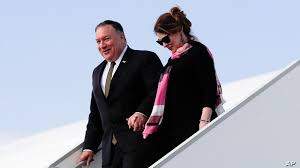US Top Diplomat Heads to Central Europe as US Looks to Confront Russian, Chinese Influence

U.S. Secretary of State Mike Pompeo is launching a weeklong trip to central Europe with a stop Tuesday in the Czech Republic where he is scheduled to give a speech and have a dinner meeting with Foreign Minister Tomas Petricek.
Pompeo is also set to visit a museum commemorating the U.S. role in liberating the region during World War 2.
The top U.S. diplomat’s trip comes as the Trump administration looks to confront Russian and Chinese economic and geopolitical competition in Europe.
Pompeo is traveling to Prague and Pilsen in the Czech Republic; Ljubljana, Slovenia; Vienna, Austria; and Warsaw, Poland, from Aug. 11 to Aug. 15.
He will become the first secretary of state since 2011 to visit Slovenia, where he will sign a Joint Declaration on 5G technology as Washington is countering risks posed by communist China’s “infiltration into high-tech networks” in the region.
The trip comes as the Pentagon prepares to move forward with a plan to pull almost 12,000 troops from Germany and redeploy part of the U.S. forces to Poland and other NATO nations, raising concerns at home and in Europe even as senior officials defend it as a strategic necessity.
Ambassador Philip Reeker, the State Department’s acting assistant secretary for European and Eurasian Affairs, said Pompeo will discuss with his counterparts the just-completed U.S.-Poland Enhanced Defense Cooperation Agreement (EDCA) that “provides a framework” to further strengthen “the broad transatlantic security.”
The defense deal enables the United States for “rotational presence” of an additional 1,000 U.S. troops to “enhance deterrence against Russia, strengthen NATO,” and to assure allies, officials say. About 4,500 U.S. personnel are already on rotation in Poland.
Energy security
Energy security will also top Pompeo's discussion with leaders in central Europe as Russia’s controversial Nord Stream 2 gas pipeline that connects Russia and Germany nears completion.
"We have been very dedicated to helping those countries find alternate sources so that they can diversify from Russia," said Reeker.
Russia has previously defended the project as economically feasible.
The U.S. has been warning about the security risks of Russian energy export pipelines, in particular Nord Stream 2. U.S. officials said if completed, these projects would undermine European security and strengthen Russia’s ability to use its energy resources to coerce the U.S.’s European partners and allies.
Czech Republic
In Prague, Pompeo will meet with Czech Prime Minister Andrej Babis to discuss nuclear energy cooperation and the Three Seas Initiative, a political platform to promote connectivity among nations in central and eastern Europe by supporting infrastructure, energy and digital interconnectivity projects.
The initiative gets its name from the three seas that border the region: the Baltic, Black and Adriatic Seas.
On Wednesday, Pompeo is set to deliver a speech at the Senate of the Parliament of the Czech Republic on bilateral ties and foreign policy.
Slovenia
In Ljubljana, Pompeo will sign a Joint Declaration on 5G technology with Slovenian Foreign Minister Anže Logar.
Over the past year, European countries, including Poland, Estonia and the Czech Republic, have signed agreements with the U.S., pledging that 5G suppliers would not be subject to control by a foreign government without independent judicial review, which effectively excludes Chinese firms.
Slovenia will join those countries in the so-called “5G Clean Networks” to use only trusted vendors to secure critical telecommunications, cloud, data analytics, and mobile apps.
Reeker told VOA it is “a reflection of the shared dedication to protecting privacy” and cybersecurity.
Austria
In Vienna, the U.S.-Austria Strategic Partnership and growing trade relationship will be high on the agenda in Pompeo’s meetings with Austrian Chancellor Sebastian Kurz and Foreign Minister Alexander Schallenberg.
Austria hosts the International Atomic Energy Agency, the nuclear watchdog of the United Nations in charge of monitoring Iran’s adherence to the 2015 nuclear deal from which the U.S. has withdrawn.
Pompeo will also hold talks with IAEA Director General Rafael Mariano Grossi, as Washington is calling on other members of the U.N. Security Council to indefinitely extend an arms embargo on Iran that is set to expire on Oct. 18.
Poland
In Warsaw, the chief U.S. diplomat will have talks with Prime Minister Mateusz Morawiecki and Foreign Minister Jacek Czaputowicz on deepening defense ties, recovering from the COVID-19 pandemic, securing 5G networks, and improving regional energy and infrastructure through the Three Seas Initiative. COVID-19 is the disease caused by the coronavirus.
Pompeo will also meet with Polish President Andrzej Duda, who visited the White House in late June.
Poland sees Nord Stream 2, which would double Russia’s gas export capacity via the Baltic Sea, as a threat to Europe’s energy security.
“In our view, it is paying with European money for Mr. (Vladimir) Putin's weapons, and we don't like it,” Morawiecki said during a recent webinar hosted by the Atlantic Council.
Morawiecki said Poland, as “the most pro-European and most pro-American country” in Europe, is strengthening the transatlantic alliance.
Last month, the State Department said people making investments or engaging in activities related to Nord Stream 2, including pipe-laying vessels and engineering service in the deployment of the pipelines, could face U.S. sanctions.
"It's a clear warning to companies: aiding and abetting Russia's malign influence projects will not be tolerated," said Pompeo during a July 15 press conference.
"Let me be clear. These aren't commercial projects. They are the Kremlin's key tools to exploit and expand European dependence on Russian energy supplies,” Pompeo said.




